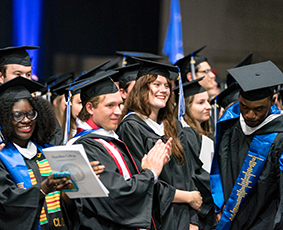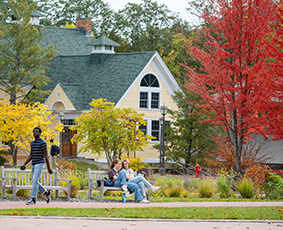A bequest may be right for you if:
- You want to make a gift to Hamilton College.
- You want the flexibility to change your mind.
- You want continued access to your wealth, should you need it.
- You are concerned about outliving your resources.
A charitable gift from your estate is a favored method of giving that enables you to achieve your financial goals and benefit Hamilton College. No other planned gift is as simple to make or as easy to change, should you ever need the assets during your lifetime.
Your gifts to Hamilton help us prepare students for lives of meaning, purpose, and active citizenship. It will provide Hamilton with the resources to…
 |
 |
 |
| Prepare graduates who will shape the future as they lead and make a difference. | Keep Hamilton accessible to the best possible students regardless of their financial means. | Fulfill the promises Hamilton makes to the extraordinary students it enrolls. |
Remembering Hamilton College in your will is a wonderful way for you to make a lasting gift. Large or small, your bequest will make an important contribution to our long-term strength and our ability to carry on with our activities.
But what if you don't have a will or living trust? You are not alone. Most Americans don’t have a will.
Without a will, the laws of your state will decide how your estate is divided. Typically, the probate court will divide your estate among your closest surviving family members according to a formula, and none of your estate can go to Hamilton College or any other charity. If you wish to have a say in how your estate is distributed, you must have a will or living trust. We encourage you to work with an experienced attorney to create a will or living trust that accomplishes your goals for your estate.
There are several ways that you can define the amount of your charitable gift to Hamilton College. They are:
You have several options for telling Hamilton College how we may use your bequest once we receive it. They are:
It is very important that your bequest be accurately and clearly described in your estate plan so that we can carry out your wishes as you intended. We are pleased to consult with you regarding the terms of your bequest to make sure that we will be able to carry out your intentions. In order to avoid any possible question that your bequest is to our organization, be sure to include our full legal name and our federal tax identification number in your bequest.
Legal name: The Trustees of Hamilton College
Current address: Advancement Office, Hamilton College, 198 College Hill Rd., Clinton, NY 13323
Tax identification number: 15-0532200
We are happy to provide you with sample bequest language to assist you and your attorney. You have complete flexibility to change your bequest at any time. If circumstances change in a way that makes you want to revise your gift to us, you can.
Because your bequest is revocable, you do not receive an income tax charitable deduction when you create it. Rather, your estate will receive an estate tax deduction for the full value of your bequest in the year it is made. Depending on a variety of factors, including the size of your estate and estate tax law at the time your estate is settled, this deduction may or may not save estate taxes.
In addition to adding bequest language to your will, here are a few other simple ways for you to make a bequest to us:
Please let us know if you have included Hamilton College in your estate plans. We would welcome the opportunity to thank you for your thoughtful gift and to confirm that we can carry out your wishes.
Latisha Hays, a widow, has been a supporter of Hamilton College for many years. Latisha is in good health now, but does not want to be a financial burden to her children should she require expensive health care in the future.
Hamilton College is one of two charities to which she has been most dedicated. She would like to make a lasting gift to each of them in memory of her husband. After discussing her options with her estate planning advisor, she decides to create a residuary bequest in her will for each of her two favorite charities. Each charity will receive 50% of the remainder of her estate after all other obligations, such as taxes and bequests to her children and grandchildren, have been taken care of.